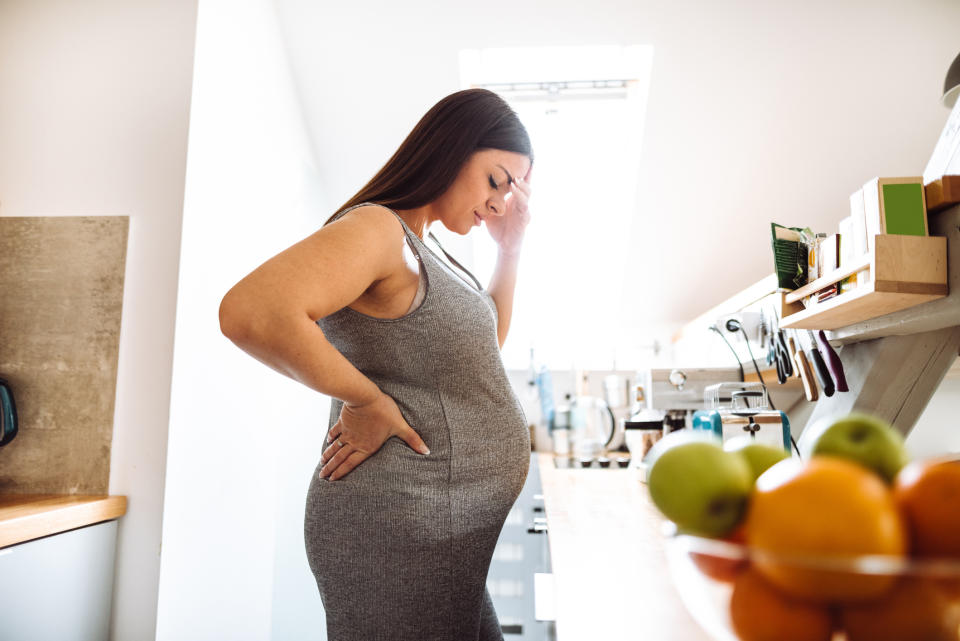Tinnitus: The lesser-known pregnancy symptom that impacts one in three women

Most of the side effects of pregnancy are pretty well documented - sore boobs, nausea and fatigue to name a few of the delights mums-to-be can endure.
But there’s a lesser known, yet surprisingly common pregnancy side effect, that affects roughly one in three women while they’re expecting: a ringing or buzzing in the ears, known as tinnitus.
The incidence of tinnitus in pregnancy is higher than in the general population and is the most common ear complaint reported during pregnancy, according to the British Tinnitus Association (BTA).
The condition affects more than one in three pregnant women compared to just one in 10 women of the same age who are not expecting a baby.
What’s more, the BTA also reveals that two out of three women who have tinnitus before pregnancy report an increase in their symptoms during pregnancy, especially during the second trimester (months four to six).
Read more: Dani Dyer shares reality of pregnancy migraines
What is tinnitus?
The NHS describes tinnitus as the name for hearing noises that are not caused by an outside source.
It's not usually a sign of any serious conditions and generally improves over time.
While tinnitus is often described as sounding like a ringing in the ear, those suffering from the condition can experience a buzzing, whooshing, humming, hissing, throbbing, music or singing.
“You may hear these sounds in one or both ears, or in your head. They may come and go, or you might hear them all the time,” according to the NHS.
Watch: 5 not so pleasant pregnancy side effects.
Why is tinnitus more common in pregnancy?
Dr Daniel Cichi from Doctor4U says there are many reasons women can suffer from tinnitus during pregnancy.
“Increases in blood pressure, swelling around the cochlea (the inner part of the ear that is a key part of hearing) caused by water and salt retention that naturally occurs in the body during pregnancy, and changes in hormones are all factors that can cause tinnitus in pregnancy,” he explains.
“Some women report a whooshing, buzzing, or ringing sound in their ears, and even a sound that resembles a heartbeat.
“The inner ear is surrounded by major blood vessels, and with the physical changes that pregnancy brings, particularly to blood pressure and increases in blood volume circulating through the body, it’s no surprise that this can affect hearing given that the key structure in hearing, the cochlea, is located close to these blood vessels.”
Read more: Rochelle Humes opens up about back pain struggle due to 'massive pregnancy boobs'

What to do if you are suffering from tinnitus in pregnancy
The BTA recommends pregnant woman experiencing tinnitus for the first time or noticing an increase in existing tinnitus should report it to their midwife or GP.
“Prompt reporting is recommended to rule out potential complications of pregnancy and to get appropriate management and monitoring,” the site explains.
“Furthermore, if tinnitus during pregnancy is accompanied by a new hearing loss then a referral for appropriate investigations will be necessary.”
Dr Cichi adds: “If you’re suffering from tinnitus during pregnancy, speak to your midwife or doctor, but you can also try and help yourself by trying things like stress management and meditation, as stress can worsen tinnitus symptoms.
“You should also try to stay away from loud noises.”
Read more: Kate Ferdinand shows off bump and talks pregnancy workout routine
Gentle exercises can also help by improving blood circulation, which can improve tinnitus symptoms.
“Keep these exercises light as any vigorous activity may worsen this condition,” Dr Cichi explains. “Anything that helps to keep your blood pressure down will also help your tinnitus, so remember to eat well and reduce your salt intake, have regular prenatal checks to monitor your blood pressure, and do not smoke, or drink any amount of alcohol.”
If your tinnitus is triggered by pregnancy it will likely stop after your pregnancy, but if your symptoms do not subside you should see your doctor as soon as possible.




